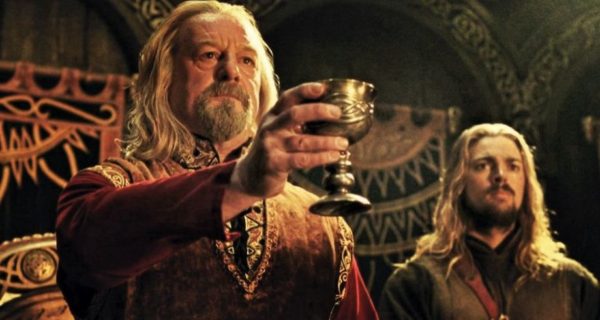J.R.R. Tolkien’s The Lord of the Rings is truly a layered work; each time you read it, you can learn something new. Maybe you’ll find a nugget of Catholic theology or finally decipher the hobbits’ family tree…or maybe you’ll discover something new that will make you stop and think.
Something similar happened to me one time while reading The Lord of the Rings–I found myself stopping to consider why Men are so important. After all, of the four free peoples, Men are kind of unimpressive. They’re not immortal like Elves; they’re more easily corrupted than Hobbits, and they’re not as strong or sturdy as Dwarves. But at the same time there is something important about their presence in Middle-Earth. In The Silmarillion this is obvious; Eru (Middle-Earth term for God), or Iluvatar to give him the Elvish name, forms Men with a desire for travel and seeing what lay beyond the borders of their land. They are also given free will; they can shape their own destiny beyond the influence of the Music of the Ainur. And, of course, Men die of old age. The Elves refer to this as the Gift of Iluvatar because they know the burdens of immortality.
In Middle-Earth itself, Men are shown to have the potential for either good or evil in themselves much more frequently than you see with Elves. And have you noticed than when it comes to a company of mixed races, it’s normally the Men that are chosen to be the leaders? Why is this? What is so important about Men?
My thought is that this leads back to free will. The way this was phrased in The Silmarillion itself was, “…they [Men] should have a virtue to shape their life, amid the powers and chances of the world, beyond the Music of the Ainur, which is as fate to all things else…” Men have a certain degree of freedom denied to other races. This makes them extremely special in all of Middle-Earth.
Another reason, too, that could factor into the importance of Men is the Incarnation, of God becoming Man. Tolkien was Catholic, so the importance of the Incarnation certainly wasn’t lost on him. Also, in some of his other works he began to lay the groundwork for the Incarnation to happen at some point in Middle-Earth. In the tenth volume of The History of Middle-Earth, titled Morgoth’s Ring, there’s a section called “Athrabeth Finrod ah Andreth”, which contains a conversation between the Elven king Finrod Fegalund and the human lore master Andreth on the differences between Elves and Men. During the course of the conversation, Andreth mentions a prophecy passed down among the humans that Eru was going to enter Ea (Middle-Earth) and save his children. This was the first time Finrod had heard of this prophecy, and both he and Andreth were confused as to how Eru could enter Ea in the first place.
Considering how the prophecy of Eru’s entry into Ea was passed down among the humans, it’s safe to say that the Incarnation was going to happen more or less the same way it did in our history; that is, Eru was going to be a Man and not an Elf, Dwarf, or Hobbit. However, despite the prophecy, I can’t say for certain this is a reason Men are considered important because although Middle-Earth is supposed to be an older version of our world, we don’t know when the Incarnation would have happened in the Middle-Earth timeline. What we do know, however, is that Eru intended for Men to join in the Second Music of the Ainur at the end of the world.
Between free will and the strong possibility of the Incarnation, I think we’ve found some valid reasons why Men are considered so important in Middle-Earth, but are they the only reasons? Are they reasons at all, or is men’s importance linked to something else? Perhaps it’s not important precisely what the reason is. Perhaps all that matters is that Eru loved them and had a plan for them that was separate from the other races, a plan that allowed for them to join him one day. The Elves may not have known what waited for them at the end of the world, but Men did.

